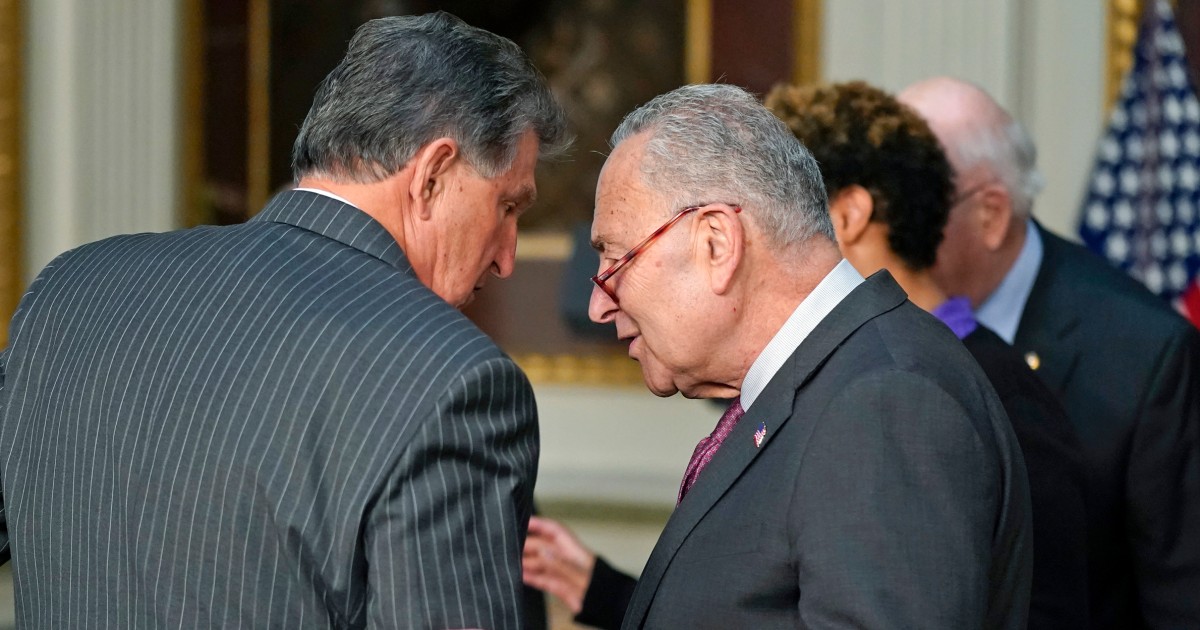This post may refer to COVID-19
To access official information about the coronavirus, access CDC - Centers for Disease Control and Prevention.

www.nbcnews.com
Congress sprints to address drug pricing, same-sex marriage and more before recess
Covid-19 infections and bad weather are threatening to delay key elements of Democrats’ agenda, including bills aimed at drug pricing, same-sex marriage, and computer chips.
Politics
WASHINGTON — A rush of Covid-19 infections and bad weather threaten to delay key elements of Democrats’ agenda during an already-hectic final sprint to a monthlong August recess.
Congress is seeking to pass a drug pricing and health care funding bill, a computer chips package, a bill to protect same-sex and interracial marriage and a host of other election-year priorities during a critical two-week stretch.
But it’s off to a bad start. East Coast storms caused the Senate to delay a vote Monday to advance the far-reaching chips bill, which is still likely to pass.
“We sure do have a lot of flights that are delayed,” said Sen. Roger Wicker, R-Miss.
And a new Covid outbreak on Capitol Hill looms over Democrats’ hopes of passing the bill to empower Medicare to negotiate drug prices, as they need all 50 Democratic-voting members present and voting in the Senate chamber to overcome unanimous Republican opposition.
Computer chips
It hasn’t gotten the same attention as other issues, like guns, abortion or Ukraine war funding, but Congress is on track to notch a big bipartisan victory on boosting domestic production of computer chips in a global shortage.
Democrats and Republican leaders, along with members of President Joe Biden's Cabinet, have argued that making the microchips at home — rather than relying on manufacturers in China and elsewhere — is crucial to national security, especially when it comes to chips used for U.S. weapons and military equipment.
By midweek, the Senate is poised to pass what’s known as “CHIPS-plus,” with the House expected to quickly follow. Biden has vowed to sign it into law.
Recently diagnosed with Covid himself, Biden held a virtual meeting Monday with CEOs and labor leaders to highlight the importance of the bill. It’s critical, Biden said, that “any part we are putting in a weapon system or a helicopter, anything we have, that we are assured that no one’s been able to tamper with that, that it is made in America, built in America, stockpiled in America.”
It's a slimmed-down package compared to the sweeping China competitiveness bill that House and Senate negotiators had been trying to reach a deal on for months. But CHIPS-plus is no small feat: It includes $52 billion in subsidies for the semiconductor industry, and it would authorize tens of billions more for science programs and regional technology hubs to keep the U.S. competitive with its rivals.
Sixty-four senators — including 16 Republicans — voted to advance the CHIPS package last week before they even finalized what was in it, a big roll call that signaled to Majority Leader Chuck Schumer, D-N.Y., to expand the legislation rather than shrink it. Now that senators know what’s in the final package, it will face a series of test votes starting Tuesday, when it will need the backing of 60 senators to move forward to final passage.
Prescription drugs and Obamacare
Schumer’s top priority before the August recess is to pass a filibuster-proof bill that includes a series of policies to lower prescription drug costs and a two-year funding extension under the Affordable Care Act to avert increases in insurance premium this fall.
Democrats struck a deal on drug pricing last month and tweaked it after a meeting with the Senate parliamentarian to ensure it complies with arcane Senate rules. A Democratic aide said the changes were minor and for purposes of clarity.
In a 50-50 Senate, just one Democratic absence could doom the bill, which requires a simple majority of senators present and voting. Two Democrats are sidelined with Covid-19: Joe Manchin of West Virginia and Tom Carper of Delaware; Sen. Tina Smith, D-Minn, who tested positive last week, returned to work Monday, according to her office. Potential GOP absences could give Democrats some room: Lisa Murkowski of Alaska said Monday she had also tested positive for Covid and would quarantine at home.
Democrats had hoped to pass a much larger bill, including provisions to combat climate change and raise taxes on the wealthy and corporations, but those are all but certain to be excluded because of opposition from Manchin, a key swing vote.
Passing the bill would also require a lengthy “vote-a-rama” process in which Republicans are likely to try to offer poison pill amendments to scuttle the bill or damage Democrats politically.
Same-sex marriage
Schumer has said he wants to find enough Republican votes to pass legislation to codify federal protections for marriage between same-sex and interracial couples.
But it’s not clear he’ll get there. For now, there are only four confirmed GOP votes: Sens. Susan Collins of Maine, Rob Portman of Ohio, Thom Tillis of North Carolina and Ron Johnson of Wisconsin. In addition, Murkowski said she supports same-sex marriage, but she hasn’t taken an official position on the legislation.
It is unclear where the five other Republican votes come from. Portman said Monday he doesn’t know whether the GOP can produce 10 Senate votes to break a filibuster. He said it’s “possible.”
Sen. Marco Rubio, R-Fla., has said he’d vote no. Also Monday, Sen. Joni Ernst, R-Iowa, declined to say which way she’s leaning on the bill, saying she’s still “getting comments” from “both sides” of the issue of same-sex marriage.
“Just going to hear from Iowans now,” she said. “They come first.”
Wicker said he doubts he’ll vote for the marriage bill.
Everything else
There is plenty more on Congress’ long laundry list.
Senators also want to ratify a treaty to allow Sweden and Finland to join NATO given Russia’s continued aggression in Ukraine and other parts of Eastern Europe.
They also want to vote again on a revised version of the PACT Act, which would provide medical coverage to veterans who were exposed to toxic chemicals from burn pits during their military service. Schumer said Monday the PACT Act should pass by the end of the week.
Across the Capitol, the House plans to take up a package of bills to help Western states deal with wildfires and drought made worse by climate change, according to Majority Leader Steny Hoyer, D-Md.
The lower chamber also appears poised to pass a “Tiger King” bill, which would ban the private ownership of big cats, like lions and tigers, and end the cub petting industry.
And Wednesday, the House Rules Committee will consider legislation to ban so-called assault weapons, a necessary step before Hoyer can bring the bill to the floor.
Democratic leaders are still trying to corral enough votes to pass it, but they want to show more aggressive action on guns after of a spate of mass shootings at a New York grocery store, a Texas elementary school and an Illinois Fourth of July parade. But Senate Republicans have shown no interest in revisiting guns after passage of a bipartisan bill aimed at background checks for juvenile purchasers and red flags this summer.
And, after having finished a series of eight public hearings, the House committee investigating the Jan. 6 attack will turn to the next phase of its yearlong probe: writing its report.
A preliminary report will come in September, said Chairman Bennie Thompson, D-Miss., which is likely to be accompanied by more public hearings. A final report will come later in the year.
Rep. Zoe Lofgren, D-Calif., a committee member, said Monday on MSNBC’s “Andrea Mitchell Reports”: “Our job as a committee, our assignment from the House, is to find the truth and to lay it out completely, the day and the events leading up to the day, and then make recommendations for potential legislative changes that could make us safer.”
























































